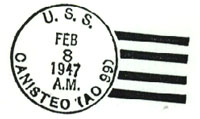|
Eastern Group Capt. Edward K. Walker, USN 
Generally speaking, the standard four-bar postmark will be found on mail from this ship during Operation Highjump (figure 1) but a very small amount of mail did receive the multi-purpose, double-circle, no-bar cancel. This is widely referred to as the "money order" cancel (figure 2). Two rubber handstamps from the ship have been seen (figures 3,4). The 'Rounded Cape Horn...' notation is of particular interest because the ship rounded the Cape from the Antarctic side and headed back south. This is almost always found on the reverse of covers on which it is found. A three-line rubber stamp reading, "NAVY ANTARCTIC / EXPEDITION / OPERATION HIGHJUMP" has been seen on some USS BURTON ISLAND and USS PHILIPPINE SEA covers. It is the author's belief that this cachet is of private origin and never used by Highjump personnel. However,
my illustrated cover above contains the nearly identical rubber stamp,
but with "Operation" spelled incorrectly. |





